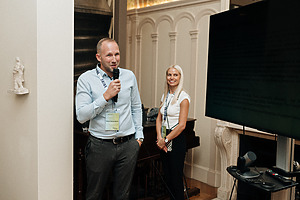At the end of September, Lithuanian scientists took an active role in the Lithuanian Season in France, showcasing the nation’s latest scientific achievements in the fields of life sciences and oncology. A scientific conference held at the Embassy of the Republic of Lithuania in France on September 25-26 brought together over 30 researchers from Lithuanian universities. This conference garnered significant interest, with researchers attending from the Lithuanian University of Health Sciences, Kaunas University of Technology, Vilnius University, The National Center of Pathology, the Center for Innovative Medicine, and various other academic and business institutions. Scientists shared their research findings and initiated discussions on new opportunities for scientific collaboration.
“The participation of the Faculty of Chemical Technology in events of this kind is of utmost importance, as it provides on opportunity to present the faculty’s research achievements on an international scale and to establish new scientific and industrial partnerships,” says Dr. Tadas Prasauskas, Vice-Dean for Research at the KTU Faculty of Chemical Technology.
 Development of international cooperation
Development of international cooperation
One of the primary objectives of the conference was to strengthen collaboration between Lithuania and France, aiming to develop partnerships with prestigious international institutions such as the Pasteur Institute, Curie Institute, and the Brain Institute, as attendees had the opportunity to visit these institutes during their stay. During the conference, Lithuanian scientists also visited the Paris Digital Health Ecosystem Center PariSanté Campus and the Clinical Research and Innovation Department of the AP-HP (Assistance Publique – Hôpitaux de Paris) University Hospitals. These institutions in the healthcare sector. Therefore, establishing closer ties and maintaining long-term relationships with these entities is essential for achieving successful outcomes in future research within the life sciences.
“The faculty community places special emphasis on life sciences, conducting interdisciplinary research in the fields of medicinal chemistry, biomedical materials, and industrial biotechnology, thereby contributing to innovations in drug development and regenerative medicine. These areas not only align with the health priorities of the European Union and national policies but also enable the faculty to participate in international programs, thereby enhancing the University’s global reputation. It is essential to convey the message that the expertise of the researchers at the Faculty of Chemical Technology allows them to join international consortia focused on conducting innovative research in the fields of life and health sciences,” emphasized Dr. Tadas Prasauskas, Vice-Dean of KTU CTF.
“The visit was meaningful. The conference providing both new connections and valuable knowledge and experiences. We had the opportunity to meet with researchers and innovations not only from France but also with life sciences pioneers from Lithuania. France is strong in its culture of science and innovation, hosting highly advanced, internationally recognized scientific institutions that are among the leaders in various cancer research and life sciences fields globally. The aim of the visit was to establish new relationships and initiate the development of collaboration,” says Dr. Edvinas Krugly, Senior Researcher at KTU CTF and an expert in regenerative medicine biomaterials, polymeric nano/microstructures, and 3D scaffold production.
The contribution of Lithuanian scientists in the European research area
The conference addressed opportunities for collaboration within European Union programs, such as Horizon Europe, which offers significant prospects for researchers to undertake ambitious scientific projects. Considerable attention was also given to the EU Mission on Cancer, which aims to develop innovative solutions for the prevention and treatment of this disease. The involvement of Lithuanian researchers in this mission would help strengthen the country’s research ecosystem and improve cancer treatment services both in Lithuania and across Europe.
Visits to prestigious scientific institutions in France provided Lithuanian scientists with the opportunity to engage directly with the work and innovations of local researchers. Such meetings not only have the potential to enrich the knowledge base of the scientists but also to facilitate the development of potential collaboration ideas that encompass not only research but also technology transfer, innovation implementation, and the strengthening of the scientific foundation.
Collaboration between Lithuanian scientist and France opens extensive opportunities for Lithuanian researchers to establish their positions within the European research landscape. Partnerships with leading French researchers represent a significant step for Lithuania in the international scientific community, ensuring that the achievements of the country’s researchers in the field of life sciences are valued and recognized abroad.